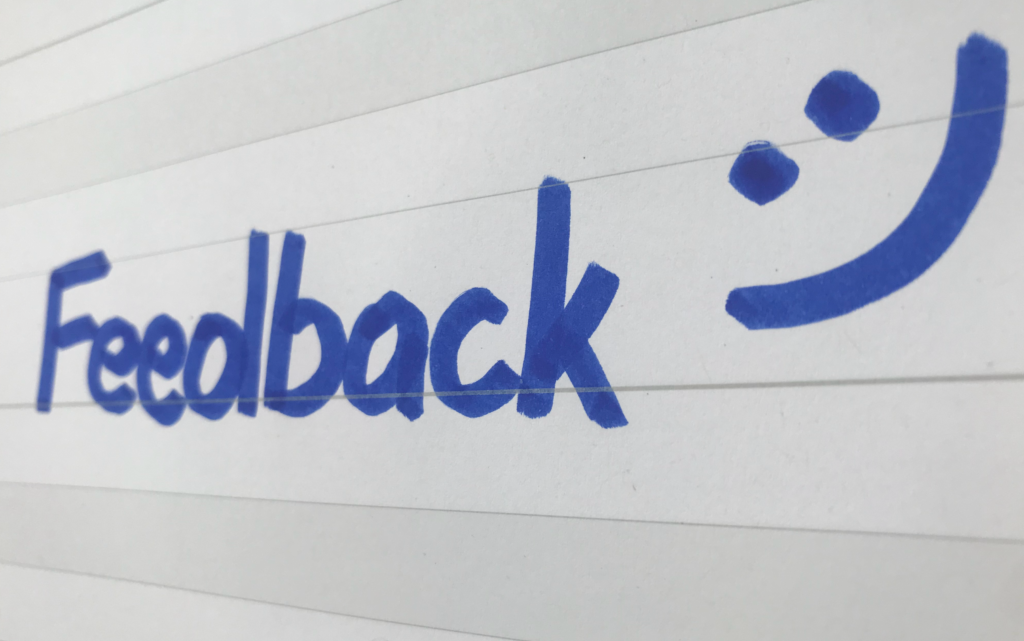Perhaps You’ve heard a lot of recipes, methods of giving a good feedback. Which of them it is the best? Why? The major thing what I wanted to tell You is that it doesn’t matter which “recipe” You use provided that You are :
-
-
- not honest in it;
- not open to analyze yourself.
-

Without these two aspects any feedback will be bad. When else?
Bad feedback is:
-
-
- Person-centred, not solution-oriented recommendations, for example:
“This meeting is way too long because of you.”
Here we don’t have any reasonable dissatisfaction. The person receiving this type of feedback acknowledges only the pure fact that the meeting took too long, but has no idea why. Of course, there a trace of some reason in saying “of you” but it has no value. Moreover I can say that it is aggressive and harmful.
The better way to express yourself will be:
“This meeting was too long. I had another meeting after it and I was late for it. Please take care of the timing in the future.”
Here we a have reason for dissatisfaction, but also a specific request for the next time. - Lacking any applicable tips and recommendations.
When our feedback is not beneficial for the area of common responsibility, it is useless and even harmful. For example when we are telling feedback about a situation in which we did not participate but onlyheard some opinions.
- Aggressive.
What is aggression? For me, using judgements is a form of offence. For example, “You’re not good enough”. It can make a receiver feel unpleasant emotions, get discouraged and close for any kind of cooperation. When we want to tell such words the good way is to consider the meaning and purpose first. For me, this form of communication gives a plenty of information about the person who shapes it. I can suspect that for a speaker it is some kind of defense mechanism. Perhaps, it is also an unconscious behaviour. By saying “You’re not good enough” we don’t give any valuable information to the receiver, only that “something was bad”. But what? Who? What are the consequences? And what can we do with this? - Aggressive.
- Person-centred, not solution-oriented recommendations, for example:
-
Good feedback:
-
-
- Facts-based, data-based
Giving a fact-based feedback brings people to the same reality. When we describe a situation without any trace of our opinions we give space to the same understanding of each other. For example:
“The meeting took an hour. It was supposed to last 30 minutes. I was late for the next meeting”.
- With the consequences caused by these actions.
That’s what makes it feel real. We are not concentrating on the receiver but on ourselves. To my mind, the best way to do so is by expressing our feelings caused by these facts. Why feelings? That is the first step towards understanding what I (a person who gives feedback) need in such a situation. Once the feeling is identified, finding an unmet need is easier. Moreover, it may show us that feedback which we plan to give shouldn’t be directed towards this person. Therefore, we need to prepare for giving feedback! Going further which our example:
“The meeting took an hour. It was supposed to last 30 minutes. I was late for the next meeting. I was angry.”
- With our needs which were not met (or met!) by the situation.
While doing so, we are expressing clearly what we have gained and lost in course of the situation. Again, this motivates us not to focus on our receiver. During the preparation for this step we can see that our first thoughts were missing some data about us. Finding unmet needs also helps us to figure out the improvement-oriented suggestion which can be applied next time.
“The meeting took an hour. It was supposed to last 30 minutes. I was late for the next meeting. I was angry because during the meeting I needed clarity on when we plan to finish.”
- Including a request about what can be done better.
While giving a suggestion, we show the receiver what action can be beneficial for us next time. It also gives a space to collaboration. The important thing to remember here is that a request is not a demand. We ought to leave space for a receiver to agree or disagree.
“The meeting took an hour. It was supposed to last 30 minutes. I was late for the next meeting. I was angry because during the meeting I needed clarity on when we finish. Could please make sure everyone has time in the future?”.
- Well-prepared.
Good preparation helps us to understand ourselves and supports us in excluding judgements or opinions from our transfer. I think that for me a space for preparation also gives more courage for giving feedback.
The steps described above are a reference to the four steps of Marshall B. Rosenberg NonViolent Communication. Nevertheless, there is no recipe. Using these points won’t give anything good if the intention is not honest – like if we want to manipulate people.
Here I wanted to sow a seed of curiosity about NVC. This is only a small piece, I can say an introduction to a better way of life. If you are interested in more, I would recommend:
- watching https://www.youtube.com/watch?v=H5pVaQi21gQ
- and reading a book “Nonviolent Communication: A Language of Life” Marshall B. Rosenberg.
Today I finish our journey with a quote:
“Every criticism, judgment, diagnosis, and expression of anger is the tragic expression of an unmet need.”
Marshall B. Rosenberg
- Facts-based, data-based
-

